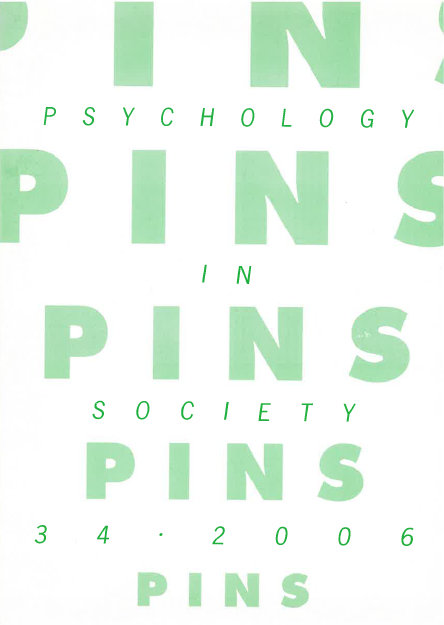BETWEEN RACE; BEYOND RACE: THE EXPERIENCE OF SELF IDENTIFICATION OF INDIAN-WHITE BIRACIAL YOUNG ADULTS AND THE FACTORS AFFECTING THEIR CHOICES OF IDENTITY
DOI:
https://doi.org/10.17159//2309-8708/2006/n34a1Abstract
This study, based on my doctoral research, is an exploration of how nine Indian-White biracial young adults interpret their social reality, especially with regard to their understanding and experience of racial identity. I chose life histories as a method in line with my view of social identity as a resource that people draw on in constructing personal narratives, which provide meaning and a sense of continuity to their lives. As a life history researcher I started with the assumption that by asking the participants to tell me stories of their lives I would gain access to how biracial young adults interpret their social world and what they believe about themselves. All of the primary research took place within the Durban area. In giving an account of their identities, the nine biracial young adults in my study described their life worlds as the sum of many parts, which included but was not limited to their racial identity. With regards to racial identity, the participants chose a variety of ways to name themselves. Four self-identified as Indian, one chose not to place himself into a racial category, and four named themselves as Indian and White or mixed race. None of the nine Indian-White biracial young adults in my study named themselves as White, and none identified themselves as Coloured. The participants named a combination of factors as influencing how they identified – at times these were not without inconsistencies and contradictions. While some factors were more salient than others, I argue that no single factor that influences identity can be looked at in isolation or as assumed to be more important from any other. In their account of the various factors that contributed to their understanding of racial identity, none of the participants identified their assigned racial classification as having a direct influence on their choice of racial identity.
Downloads
Downloads
Published
How to Cite
Issue
Section
License
This journal is an open access journal, and the authors' and journal should be properly acknowledged, when works are cited.
Authors may use the publishers version for teaching purposes, in books, theses, dissertations, conferences and conference papers.
A copy of the authors’ publishers version may also be hosted on the following websites:
- Non-commercial personal homepage or blog.
- Institutional webpage.
- Authors Institutional Repository.
The following notice should accompany such a posting on the website: “This is an electronic version of an article published in PINS, Volume XXX, number XXX, pages XXX–XXX”, DOI. Authors should also supply a hyperlink to the original paper or indicate where the original paper (http://www.journals.ac.za/index.php/pins) may be found.
Authors publishers version, affiliated with the Stellenbosch University will be automatically deposited in the University’s’ Institutional Repository SUNScholar.
Articles as a whole, may not be re-published with another journal.
The copyright of the article(s) lies with the author(s).
The copyright of the journal lies with PINS-psychology in Society.
The following license applies:
Attribution CC BY-NC-ND 4.0 - https://creativecommons.org/licenses/by-nc-nd/4.0/

